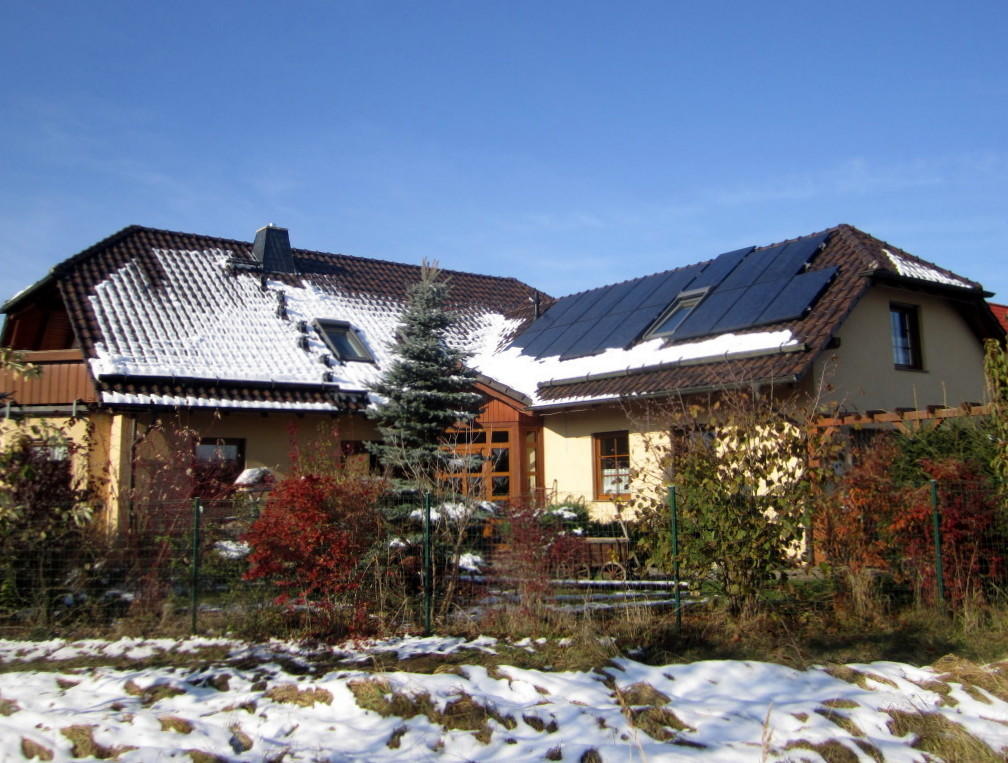When the house suddenly the lights go out, turn off not only the bulb. For owners of country houses for suspending the supply of electricity often means that they will stop working and heating, and water supply, and, alas, Sewerage. Is it possible to secure your home independent from the grid?
Let’s comprehensively look at this problem and analyze all the ways to create energy autonomy of the cottage under the most difficult weather conditions.
The situation depends on the type of the applied energy — electric or heat. To produce thermal energy directly to the area required for solid and liquid fuel or gas (centralized or imported). About them we’ll talk. And yet let’s deal with the reasons for termination of supply or reducing the quality of electricity.
Problems with the supply of electricity
Problems with electricity supply of the country house include:
- excess or decrease in voltage relative to the norm;
- supply voltage with parameters that do not match the requirements of the manufacturer of equipment which is used in the house;
- the complete lack of electricity.
Long-term power outages are rare, but they can not be ignored. Indeed, in this case ceases to operate all electrical equipment of the boiler room, there is a real danger of defrosting of systems of heating and water.
As the domestic practice, an ordinary house when you turn off the heating victoriasa approximately 2-3 days. Of course, no negative consequences will not do here. But if you use it in the freezing coolant, damage can be avoided.
No current concerns not only boilers, but also the accompanying equipment, which requires continuous and quality power.
A traditional heating system consists of:
- the heat source (boiler burner)
- circulation pumps
- valves
- pipelines
- the distribution manifold.
For the operation of the boiler and the burner and circulating pump and associated electronics required AC sinusoidal voltage 220-230 V with a frequency of 50 Hz. The quality of the energy in the electric system defined in GOST 13109-97. This normative document stipulates the deviation from the nominal value of 220 V ±5 %.
If the voltage is not “up” to 208 or exceeds 232, electronic assemblies and circuit equipment can fail (or their performance will not match the desired values). A shame, but such conflict is not considered a warranty issue. Therefore, replacement or repair of equipment will have to pay the consumer. What motivates the owner of the garden to take care of a reliable energy supply for Autonomous boiler room.
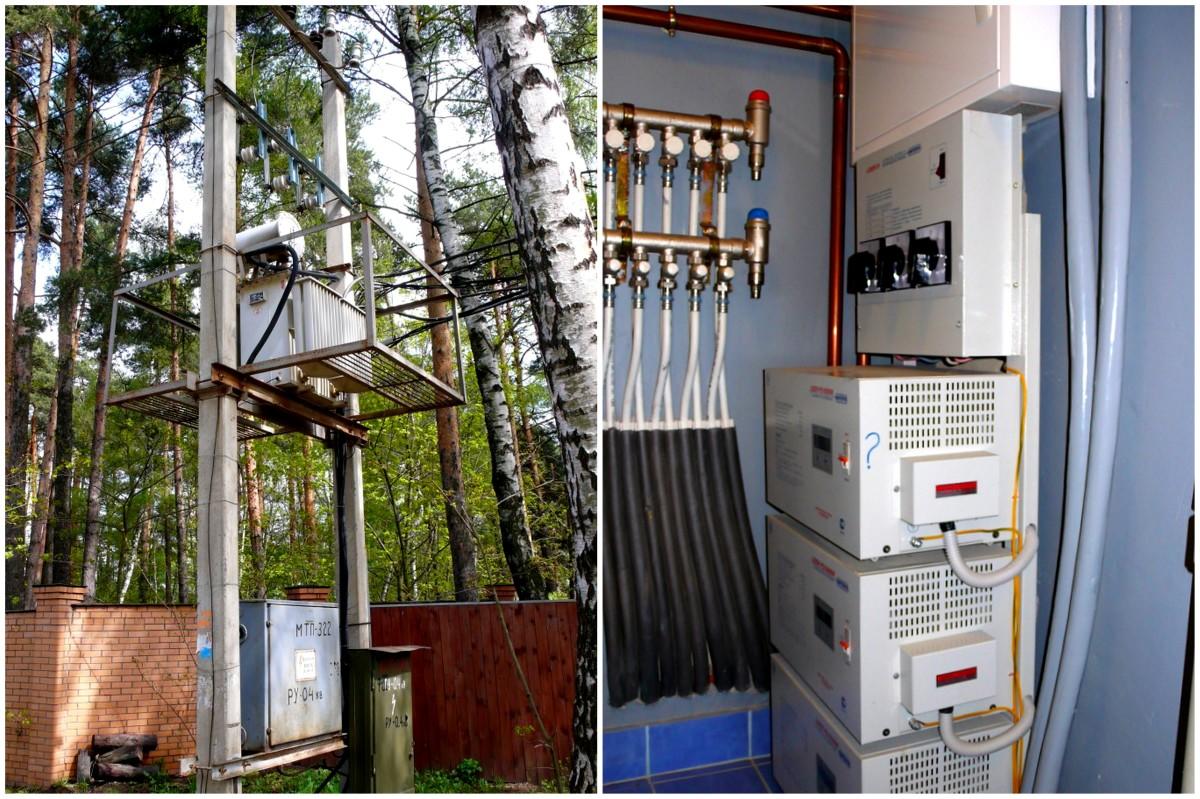
Are there any other reasons for the shortages of electricity? Yes, a lot of them. It is a horse race or a momentary voltage SAG, the gap between “neutral” and just lightning discharges. Of course, engineers have ways to solve or at least mitigate such problems.
Road map to energy independence
To ensure country houses reliable power supply, and also for normal operation of all engineering systems (heating, water, sewer, alarm) is used:
- voltage stabilizers
- uninterruptible power supply (UPS)
- a diesel generator set.
Each of these devices is designed to solve a particular task and protects against a certain type of defects of utility power.
We are for stability!
A voltage regulator automatically maintains the network user to the desired nominal voltage by adjusting the voltage drops in the network. In an emergency jump it will switch off the equipment from a source that has become dangerous. Therefore, the main parameter is the reliability of this device is its speed. If the period of operation greater than 1 sec, the electronic components of the boiler equipment are at risk of losing efficiency.
A separate issue is the choice of stabilizer on the value of power. It is unlikely that all devices on the plot, electricity consumption will be included and work at the same time. You must know that when using asynchronous motors, compressors, pumps, power stabilizer needs 3-5 (!) times exceed the rated power of the consumers. So the calculation of total power must be made deliberately with regard to all the circumstances.
Even before the moment of purchase need to decide what type of stabilizer you need single phase or three phase. Even if your area has or is suspected of at least one three-phase consumer, will have to buy three-phase.
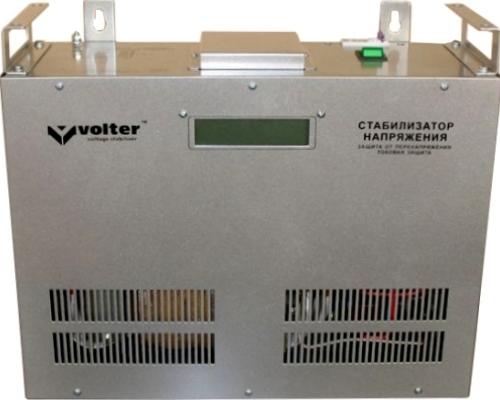
Modern gas boilers basically operate only when power is applied. Though small, but absolutely necessary. Each species electro-sensitive components is their energy consumption:
- electronics boilers and gas valves consume no more than 80 watts,
- circulating pumps — up to 200 W,
- burners with fans — 50-300 watts.
The average for domestic boilers with integral burner and pump should be no more than 250 watts (forgive me, true connoisseurs of the heating craft, but I deliberately omit information about burners, more about their requirements to power supply: this topic is too specific).
It is hard to imagine a gas boiler without a safety devices. Without them nowhere. But they become the most vulnerable place in case of problems with electricity supply. Talking about systems, emergency shutdown and gas shut-off solenoid gas valves. They “pull” no more than 35 watts. When a possible power outage, the gas supply stops automatically, the valve will close within 8 milliseconds. But this, unfortunately, means that even such a momentary interruption of power supply results in a shutdown of the boiler, so to run it then have to manually. Therefore it is necessary to ensure that the system power emergency shutdown of gas was continuous.
When you buy stabilizer you should know that it is more profitable to purchase one powerful device and to protect the entire house completely, not just circle group. Stabilizer high power reliable in operation.
Stabilizers are considered good in case of brief power outages and quality, but useless in a real emergency in the supply of energy. In this case the country economy is not left in the lurch uninterruptible power supply (UPS) or diesel generators that enable the automatic resumption of supply of electricity. Get acquainted with both saviors have not frozen truckers closer.
Uninterruptible power supply (UPS)
The UPS consists of a power supply and batteries. When the UPS is included in the network, there is a natural recharging of the batteries via a battery charger that converts AC line current needed for 12V batteries. At the same time provided the power supply is 220V directly on the gas boiler and other equipment. When the batteries are fully charged, the charger disconnects and is provided by a standard power supply system.
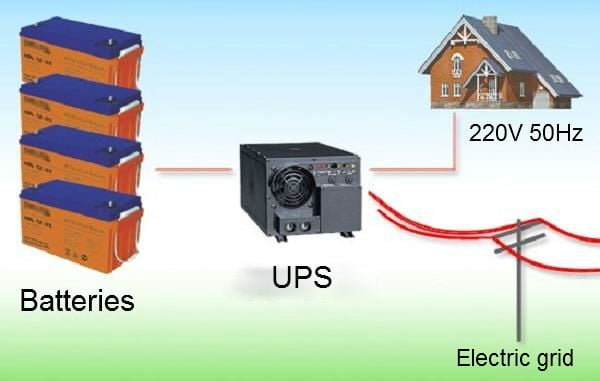
In the case of disconnection of centralized water supply, the uninterruptible power supply guarantee a long (several days) of continuous operation of the heating system. Good quality uninterrupted provide power supply of the heating system even when fully stops the supply of voltage or deteriorates its quality in the core network.
In the first case the generators go into standby and generate a stable AC voltage (220 V, 50 Hz) sine wave using the battery. When the network is restored, they charge the battery.
The latter needs to withstand at least 500-600 cycles of charge-discharge, and much depends on the “work schedule”. In today’s busy life — say, a daily recharge — the life of the batteries may be reduced to 2 years. However, quiet work without hectic activity, the battery life can be extended up to 8-10 years, after which their capacity will start to fall and need to be replaced.
With regular interruptions or in the absence of electricity UPS power for its characteristics can not compete with an electric generator with the internal combustion engine. But it will be a great addition to it. Although, of course, such a reservation of capacity will cost more.
It’s better to use generator only for recharging the batteries of the UPS. This approach has two advantages:
Combined heat and power
Justified replacement of the UPS will be generator-powered internal combustion engine (petrol or diesel). In hardware kit included
- the internal combustion engine with an electric generator,
- automatic control, reacting to loss of primary power (or manual run). This machine, a rotating shaft of the generator, enables the production
- normative on the parameters of electricity.
As an example, it is possible to result miniature gasoline generator ITC Power GG900Si power only 0.75 kW. It is designed as a suitcase and weighs 12 kg. the Fuel tank is designed for 1.6 liters and fuel consumption is 0.5 liter per hour. That is, every three hours will have to top up with fuel. By the way, don’t forget to turn off the unit.
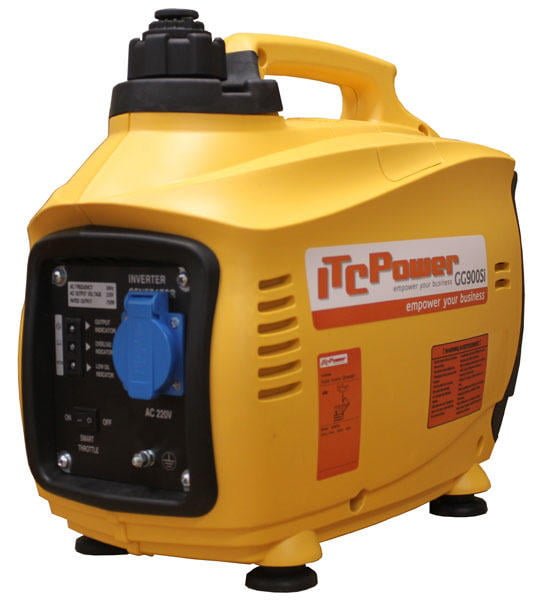
Disadvantages of power generators:
Some devices are performed in noise-reducing buildings, which, of course, increases their cost. It makes sense to think about placing their own combined heat and power somewhere in the backyard. At least, not behind the wall the master bedroom.
The appearance of the farm is such a powerful installation entails a number of problems:
- It is necessary to take care of the tanks for storage of fuel and engine oil.
- Then there is the need to ensure fire safety.
- If you are a prudent owner, you have to think about scheduled repairs and maintenance of diesel or gasoline generators.
However, that does not make for the sake of independence of their own homes.
Well-forgotten alternative
Is it possible to use the gas boiler if there is no electricity? Yes, you can. But for this we should not strive for novelty, and to establish in the country the appropriate boiler. Separate models of domestic and imported boilers are able to work without electricity. Available in automation thermocouples ensure the generation of the thermo-power for normal operation. “And how will work the pumps?”, — ask the attentive reader.
The need for circulation pumps is not here. Transfer the warm water for the heating system occurs due to natural temperature changes: hot coolant rises up through the pipes, and the cooling returned to the boiler.
The real disadvantage of this “innovative” approach — what is needed to install large diameter pipe more than 1 inch (25 mm), and the heating system is very cumbersome, long time warming up and slowly responds to commands to change the temperature.
Apart from wood?
The reliability of the boiler operation are ensured a guaranteed supply of fuel. In the majority of cases we are talking about network gas or diesel fuel.
The gas supply system takes the methane gas with a working pressure of 13 and sometimes 20 mbar. The specific value depends on the region or the potential timing node. Methane must have a pressure and volume flow at the entrance to the boiler for generating the right amount of energy.
As recommended in the operating instructions of the heating equipment, the gas input pressure to the boiler should not be less than 11, 5 mbar. However, as practice shows, at very low temperature the pressure of methane can be reduced to 8 and sometimes up to 3-4 mbar. In this case, do not expect the boiler design capacity. It will simply stop working. Or damaged burner for burning a low flame.
In addition to sharp frosts, the reasons for the fall of pressure in the networks could be clogging or freezing of water in pipelines, abnormal operation of valves or gas regulators in distribution cabinets.
What if in the winter the gas pressure is extremely low? Not freeze?
We can recommend several solutions:
- To stock up on a backup boiler that runs on another fuel (electricity, firewood, diesel fuel).
- To get a boiler capable of operating at low gas pressure of 3-4 mbar.
- To use the boilers more power than is needed to heat a country house. But the price of powerful boilers is considerable.
- Set on a plot of high-tech system of independent gas supply. Of course, it’s not about portable cylinders for gas cookers. The Moscow node is successfully competing three decent company, guaranteed to deliver this fuel at the “first call”. However, I do not know how they have developed networks of mobile stations in all regions.
Gas ordered?
The system of independent gas supply on base of liquefied petroleum gas (LPG) consists of:
- underground tank,
- unit control and safety valves,
- the pipeline
- the gas boiler.
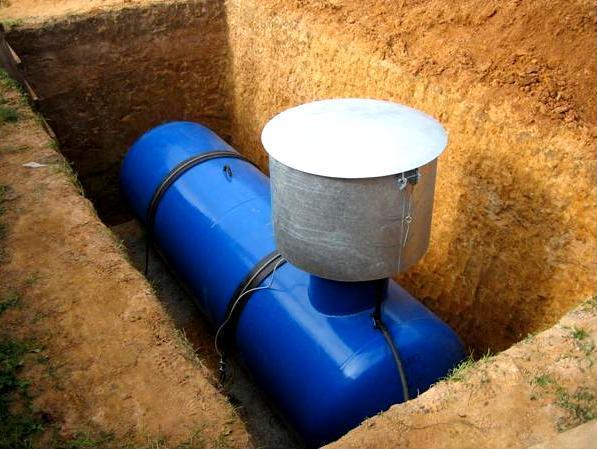
The LPG tank is under pressure of about 10 ATM. The output from the tank is the regulator that lowers the pressure of the evaporating gas to 0.3-0.5 ATM — as in underground piping and at the inlet to the gas boiler. This pressure corresponds to a pressure gas network in our apartments, so no difference in operation there.
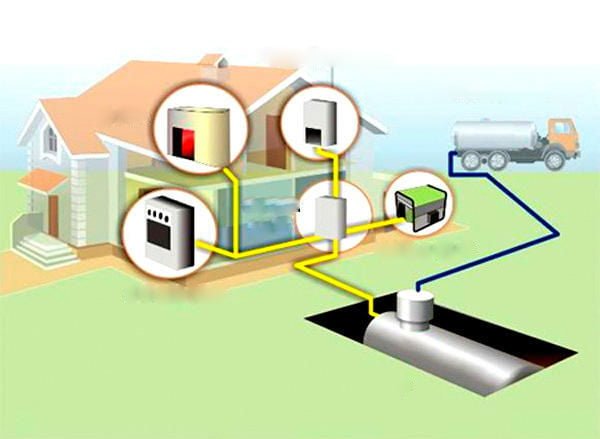
System based on liquefied petroleum gas (LPG) has a number of indisputable advantages:
- Provided by the usual urban comfort when using methane.
- The system is simple to operate: there is no ash, no soot or oxides and odor of sulphur (as from diesel fuel).
- LPG designed and manufactured with maximum safety for humans and the environment. The gas tank is located underground and has a double margin of safety relative to the operating mode of the system.
- Heating with the use of LPG is cheaper than diesel or electricity.
- Refueling is as simple as refueling a car at gas station. You only need to provide a seamless car-tanker to the tank (filling hose length of about 10 meters.
- The manufacturer guarantees the service life of the tank not less than 20 years.
This system really makes the individual cottage the status of energy independent areas. That is to say, the goal is achieved.
Miniature firewood
The youngest type of fuel that can heat a country house, — wood pellets. Their use in solid fuel boilers really increases the level of energy independence of the cottage. They look like small sticks with a length of 6 cm and a diameter of about 8 mm. fuel in the furnace used screw screw: just like in a meat grinder. Thus, there is no post of fireman (eternal headache when operating solid-fuel boilers, and in the literal and figurative sense) and it is possible to automate the flow of pellets.
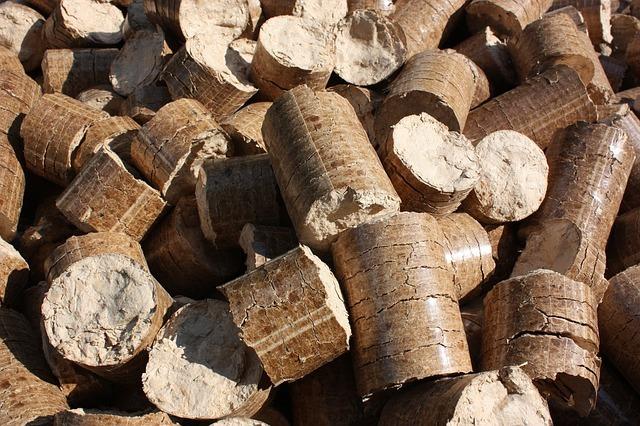
But we do not forget that pellet boilers are also consumers of electricity. No they are not going anywhere. This fan and the electric motor drive the screw, in the other schemes, plus the pump. In total, they “pull” at 200 watts, and the screw is just 2-3 minutes in an hour. Agree to find such power for 100% heating of the cottage is not difficult, especially after reading the first Chapter of this article.
Have pellets and another important advantage is the reduction in fire hazard compared to gas and diesel fuel.
obscure prospects avant-garde solutions
It is impossible not to recall the now fashionable renewable energy sources, able to provide energy independence and vitality of a secluded country house.
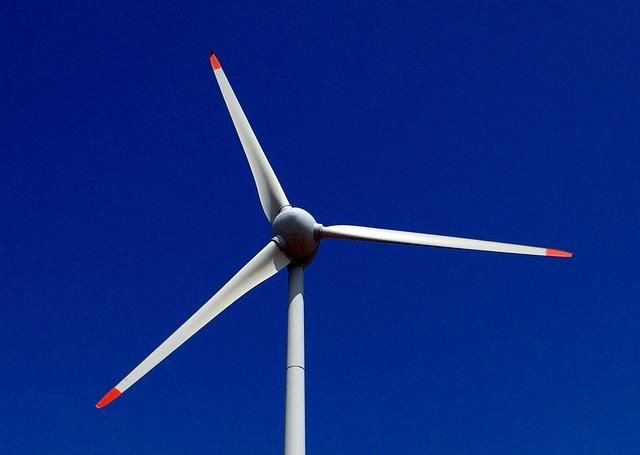
It would seem, put it next to the house “wind mill” and you will have happiness. However, as usual, the devil hides in the details. Indeed, there are wind turbines, consistently generating high-quality electricity. For example, a small (12 meters height) mill is capable of producing about 3 kW. But where to find this steady wind constantly filling the rotating blades of the power? The gardening Association? In the woods? Really: where? It is unlikely that you will supply your house with a garden on a cliff, blown at least a light breeze.
But finding the wind is not the most important thing in this energy trap. The fact that the rotation of the blades of this machine generates low-frequency vibrations in the air, negatively affecting the nervous system of any animal, not just humans.
If you put a “windmill” away from housing, in the open field, rodents will alter the path of their migrations. The same will happen with fish, you put it on the island (or stilts) in the middle of the pond.
So, this option for the garden is not suitable. Then, maybe, solar photovoltaic panels on the South roof?
A good thing, but you have to understand: to obtain 1 kW of electricity will have to deploy in the most modest case, 17 square meters of these panels. That is enough energy only for weak electric kettle. And how to work the panel if they drop snow? Guess? And who will sweep the slippery roof the snow? Yes, and asocial elements, forever wandering the empty paths in the autumn of the horticultural society will be glad to become owners of technical innovations, which can quickly convert all the plain liquid fuel for direct warmth. In short, solar panels bring with them a range of problems of different nature, although by themselves they are technologically good.
In General, however, modern technological developments allow real energy independence of a country house. Considering a combination of different techniques, you can create on your site an island of warmth, light and comfort, even if the Central power supply fail.
